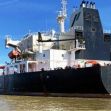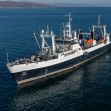Two Alaskan seafood shipping companies have agreed to pay $9.5 million to end a lawsuit that accused them of violating the U.S. Jones Act. The settlement will be the second largest settlement ever involving a violation of the act, the Department of Justice said last Friday.
The settlement is the result of a lawsuit brought forward by two companies, Kloosterboer International Forwarding and Alaska Reefer Management. The two companies were a part of the American Seafood Group family and provided transportation and logistics services for seafood vendors. However, the federal government says their operation was in direct violation of federal law. The two companies brought a lawsuit against the U.S. government after they were hit with fines and penalties for violating federal law.
Under the Jones Act, merchandise that is shipped between American ports must be shipped on American-flagged vessels. The exception to this act allows seafood from Alaska to be transported into the US mainland only if it travels along Canadian rail.
The two companies maintained that they did not violate the Jones Act. However, the Justice Department said that for over a decade, the two companies moved frozen seafood from the Dutch Harbor in the Aleutian Islands to a port in New Brunswick, Canada, using foreign-flagged vessels. Once the goods arrived at the Canadian port, the seafood cargo was transported from the vessel onto trucks. The trucks would then be driven onto a flatbed rail car on the Bayside Canadian Railway, a controversial railway that spans roughly 200 feet. The trucks would ride the length of this railway until they were driven off the train cars near a border crossing in Maine for shipment into the US.
Federal officials say that the 200-foot rail track that was used was illegal and did not meet expectations laid out in the Jones Act for transport on a Canadian Railway. As a result, the seafood shipping companies racked up steep fines and penalties which ultimately culminated in the settlement announced last week.
Before the two companies began using the Bayside Canadian Railway, the Justice Department says the two companies legally transported frozen goods using the New Brunswick Southern Railway, a track that spanned over 30 miles. However, the Justice Department argued the Bayside Canadian Railway was built to save money, went nowhere, and was constructed simply to circumvent regulations laid out in the Jones Act.
Alaskan federal courts agreed that the shipments using the Bayside Canadian Railway were illegal because the seafood was not actually “transported” on the short railway.
In announcing the settlement, U.S. Attorney S. Lane Tucker for the District of Alaska shared, “Our prosecutors and law enforcement partners did a tremendous job successfully investigating and litigating this complex case. Our office will continue to dedicate resources to ensuring the laws in place to protect fair maritime commerce are followed by all industries in Alaska.”
AnnMarie R. Highsmith, executive assistant commissioner with the Office of Trade in U.S. Customs and Border Protection, adds, “The resolution of this case sends a clear signal that CBP will use its law enforcement powers to detect and deter schemes that are designed to circumvent laws — such as the Jones Act — which are intended to protect U.S. industries.”






